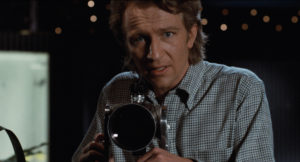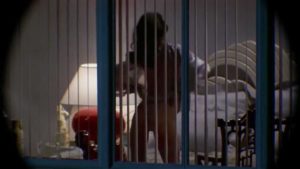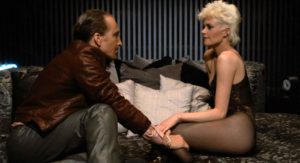 Review: One Night Only
Review: One Night Only
Body Double | Brian De Palma | USA | 1984 | 109 minutes
UW Cinematheque, 4070 Vilas Hall, Friday, September 16, 8:45pm»
Emily Caulfield concludes Madison Film Forum’s coverage of the UW Cinematheque’s Brian De Palma series with an ode to one of his most celebrated films, Body Double.
Bawdy, violent, and cheerfully, relentlessly disorienting, Brian De Palma’s Body Double is the kind of film you’ll watch with your jaw firmly on the ground, in horror, in spasms of laughter, in sheer dazzlement.
A vertiginous Rear Window for the MTV era, Body Double works both within and without the Hollywood system. De Palma mimics genres with his signature over-the-top film school style—Hitchcock and Corman and Busby Berkeley all lined up and snorted in the same breath.
In 1984, Roger Ebert called the film “an exhilarating exercise in pure filmmaking.” It exhilarated me; it really gets the blood pumping, if for no other reason than the prism of De Palma’s visuals. A director who never lets us forget that the camera is far more effective than the eye—and that neither is necessarily a truth-teller—De Palma chooses to play with editing, movement, and mise-en-scene over exposition any day. The juicy thing about Body Double is its willingness to go all in, on every hand, even if every card is a different suit. Is it a movie about show business or an exercise in formalism? Is it pastiche or parody or porn? A cheerful rubbing of Hollywood noses in excesses of every kind?
We begin in a graveyard, camera creeping down over gravestones, through smoky fog. We’re quickly clued into the artifice of the film—if the title didn’t set off any bells, we’re hamfistedly informed that this is Hollywood, land of lies, of doubles and tricks, smoke and mirrors, flaming sunsets painted on wood. Nothing is as it seems, and you can’t believe anything you think you’re seeing.
Our non-hero hero, working actor and beige paint sample Jake Scully (Craig Wasson) has run into a streak of bad luck. His claustrophobia costs him a vampire role in a corny, Cormanesque picture (helmed by De Palma proxy and undisputed badass Dennis Franz). Jake’s beautiful girlfriend (Re-Animator screamer Barbara Crampton) is balling some other guy who, in Jake’s words, makes her glow like he never could. The look on her face when Jake catches them in bed together is hilariously unapologetic.
So, hard up and out of a home, he runs into an actor colleague Sam Bouchard (the always energetic Gregg Henry), who, after watching Jake get skewered in an acting class, offers him a rare and seemingly wonderful proposition: shelter in his friend’s ridiculously lavish space needle-style sublet (LA’s famous Chemosphere) in exchange for watering the plants while Sam’s in Seattle. Their encounter is bizarre; Sam’s too intense somehow, too chummy. The best part about the place is the view, he says, casually pointing out the telescope set up by the window. Go on, take a little look.
 A beautiful woman, Gloria Revelle (the lovely Deborah Shelton), dances by herself in another lit window across the way, “like clockwork, every night.” She’s topless, in spangled underwear and heels, a floaty robe drips and waves around her like cool water. She puts something in a safe and does a burlesque striptease and lays down and goes to town. The whole thing is hypnotic and weird. Pino Donaggio’s slow-moving, synth heavy Risky Business-style score and the woman’s undulations almost make us forget that Sam’s still in the room, standing overly close, beadily watching Jake watching her.
A beautiful woman, Gloria Revelle (the lovely Deborah Shelton), dances by herself in another lit window across the way, “like clockwork, every night.” She’s topless, in spangled underwear and heels, a floaty robe drips and waves around her like cool water. She puts something in a safe and does a burlesque striptease and lays down and goes to town. The whole thing is hypnotic and weird. Pino Donaggio’s slow-moving, synth heavy Risky Business-style score and the woman’s undulations almost make us forget that Sam’s still in the room, standing overly close, beadily watching Jake watching her.
With a hearty slap on the shoulder and a “so long!” Sam skedaddles off and Jake’s left alone in the spaceship, with nothing to do except watch MTV from the revolving bed. This proves less exciting than his neighbor, so he hops back to the window for another little peek, but the late show is scarier than the one before. He watches a man come into her place, raid her safe, and push her around. Jake, the perfect patsy, doesn’t know what to do, so he does what he always does in a tight spot: he freezes.
The next night though, she’s undeterred. Jake breathes, “just like clockwork.” She’s at it again, the same glittering of panty, same slow unrolling of stocking. But this time they both have company: Jake watches another man secretly watch Gloria, and the next day the man follows her out of the Hollywood Hills into downtown Los Angeles. Jake follows both of them, but he has to keep his distance because if he tells Gloria she’s in trouble, he has to admit that he’s also been watching her. Nobody likes a peeping Tom.
Later, Jake realizes the code to this mystery just might be cracked by talking to Holly Body (Melanie Griffith) a porn star whose moves are eerily similar to Gloria’s. To meet the famous Body, Jake decides to try out for a role in her latest, Holly Does Hollywood, during which we’re treated to an absolutely surreal and show-stopping number: an elaborately choreographed set piece tuned to Frankie Goes To Hollywood’s “Relax.”
 Holly provides Melanie Griffith her best role since being nearly pawed to death in Noel Marshall’s Roar (1981). Her paradoxical presence as straight-talkin’, no BS porn vixen and punk-haired, doll-faced waif (with that voice!) is as raw and wholly felt as anything I’ve seen on screen. The great chasm between her physicality (that cherubic pixie face and tinkling laugh), and her personality (no-nonsense hustler who knows her business inside and out), leave both Jake and the audience agape in wonder. At one point, faced with a catty actress who’s worked with Jake before, she delivers a crushing blow in dulcet tones, so quickly and deftly that it barely registers before she’s out the door, and keeps ringing in your ears for days after.
Holly provides Melanie Griffith her best role since being nearly pawed to death in Noel Marshall’s Roar (1981). Her paradoxical presence as straight-talkin’, no BS porn vixen and punk-haired, doll-faced waif (with that voice!) is as raw and wholly felt as anything I’ve seen on screen. The great chasm between her physicality (that cherubic pixie face and tinkling laugh), and her personality (no-nonsense hustler who knows her business inside and out), leave both Jake and the audience agape in wonder. At one point, faced with a catty actress who’s worked with Jake before, she delivers a crushing blow in dulcet tones, so quickly and deftly that it barely registers before she’s out the door, and keeps ringing in your ears for days after.
There’s very little explanation in Body Double. Jake doesn’t talk to anyone or ask for help, he’s basically an unattached guy trying to figure out a mystery. His bland ineffectuality makes him the perfect surrogate for an audience, and we figure out everything as he does, with only De Palma’s stunning visuals to clue us in. In the absence of exposition, the film makes great use of camera tricks like rear projection and process shots to signify certain events as real or imagined.
The most stylized visuals convey Jake’s emotions. We’re never told explicitly how Jake feels via conversations with a friend or a boss or a lover. Whether it’s consternation, fear, love or arousal, De Palma moves smoothly from the world of the plot to the world inside Jake’s head, signified by shots that are stylistically distinguished from the rest of the film.
One romantic moment is captured as full-blown melodrama: the camera spins around the clasping couple, the strings soar, and the rear projection shots approach abstraction. Later, that scene is echoed and intercut with another leading lady, further glimpsing into Jake’s troubled soul.
Another mind bender: De Palma drags us deep into danger, pulls out to reveal it’s all just another film set, then dives back into very real danger yet again. We’re at the mercy of the camera, the window to Hollywood’s soul, which itself might be make-believe. Body Double crisscrosses boundaries and styles, and De Palma never distinguishes between or favors “high” over “low” art, rather using both to convey so many things at once: biting satire and pure, uncut entertainment, Frankensteining almost everything in his arsenal into a fantastically unfathomable beast that you just have to witness to understand.
There are very few words in Body Double, relative to its running time, so why am I using so many here? Just watch it. Go on, take a little look.
Body Double will follow Obsession (1976) on Friday night.
The De Palma series will feature three more films: Scarface (Monday, September 17, Union South Marquee Theater); Mission Impossible and The Untouchables (Friday, September 23, 4070 Vilas Hall). Consult the UW Cinematheque website for details.